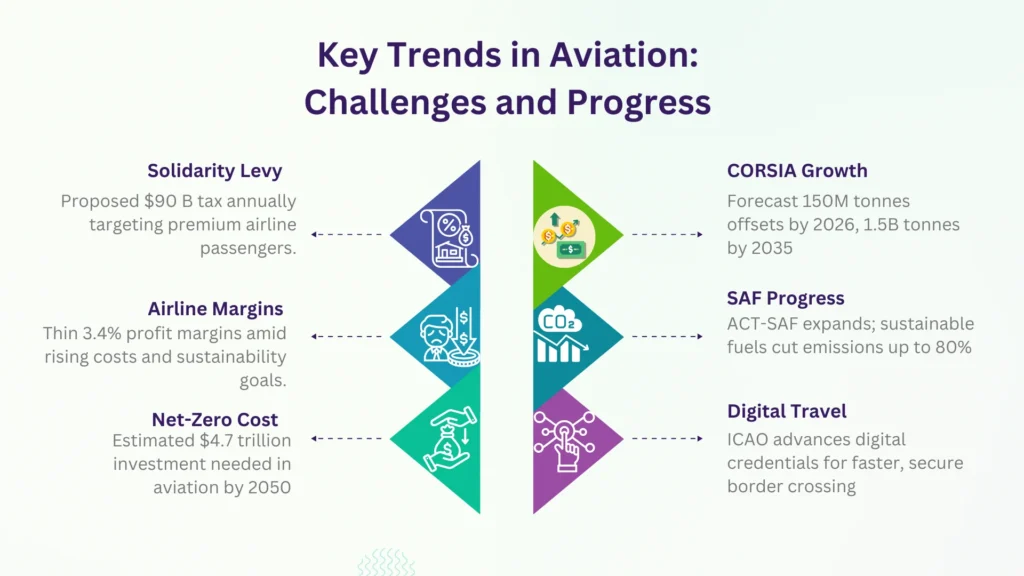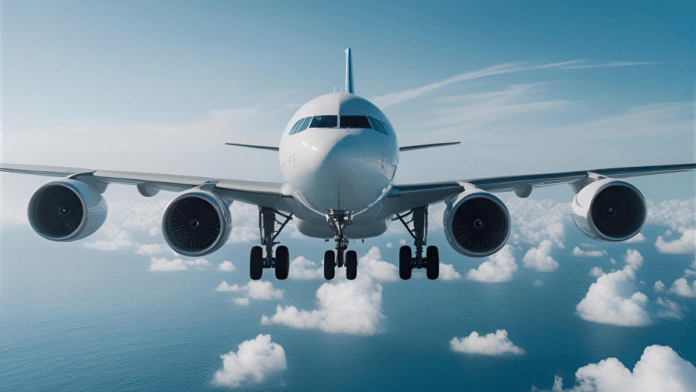Global air-levy proposals: Recently, two big groups in the air travel world have made significant moves.
The International Air Transport Association (IATA) and the International Civil Aviation Organization (ICAO) are tackling substantial issues. They are looking at how to make air travel better for the economy, safer, and greener.
What Are IATA and ICAO?
Let’s get a quick overview:
- IATA is a group of about 290 airlines around the world. They work to make air travel safe, reliable, and affordable.
- ICAO is a part of the United Nations. It sets rules for air travel worldwide. They focus on safety, security, and protecting the environment.
IATA Rejects the Global Air-levy Proposals
Understanding the Proposed Levy
A new tax called the “Solidarity Levy” was suggested.
It would target people flying first or business class. This tax could bring in about €78 billion (over USD 90 billion) every year.
| Key Figures | Value |
| Projected Levy Revenue | €78 billion / USD 90 billion |
| Airline Industry Profit 2024 | USD 32.4 billion |
| Average Industry Profit Margins | 3.4% |
| Estimated Cost for Net-Zero by 2050 | USD 4.7 trillion |
Whar are Solidarity Levies?
Solidarity levies are taxes that help fund global public goods, particularly those related to climate change. These taxes are coordinated internationally but managed by individual countries, enabling nations to raise funds for shared objectives. This approach strikes a balance between voluntary aid and mandatory rules, allowing willing countries to implement fair measures for distributing resources.
Interest in solidarity levies is increasing. The Global Solidarity Levies Taskforce, which includes governments, international organizations, and civil society, supports this growth.
Why IATA Opposes the Levy
- Airlines make very little money, only about 3.4%. Extra taxes could make things even tougher for them.
- Airlines already spend a lot to cut down on carbon emissions. They aim to meet global climate goals by 2050, costing $4.7 trillion.
- There’s already a program called CORSIA to help reduce emissions. It doesn’t need extra taxes.
- The tax plan doesn’t say how the concerned authority will use the money. This lack of transparency is a big issue.
- Targeting high-end flights could hurt global air travel. It could affect international trade and tourism.

IATA’s Message
IATA Director-General Willie Walsh had something to say: “The airline industry is an economic catalyst, not a cash cow.”
In short, airlines are essential for the economy. Taxing them too much could be a bad move.
ICAO Advances Work on Safety and Sustainability
Asia-Pacific Facilitation Forum
In early July 2025, ICAO had a big meeting. They talked about:
- How to make getting through borders easier for travelers.
- Introducing Digital Travel Credentials to speed up check-ins and make things safer.
- Working together to make air travel safer worldwide.
This meeting was part of ICAO’s “Year of Facilitation.” They want to make air travel smoother and safer for everyone.
Aviation Climate Week
In June 2025, ICAO had a big event. They talked about:
- Progress on CORSIA, the carbon offset program.
- How to tackle other emissions that affect the climate, like nitrogen oxides (NOₓ).
- Using Sustainable Aviation Fuel (SAF) to cut emissions by up to 80%.
- Creating green airports with new technologies.
During the week, ICAO also started the Finvest Hub. It’s a place where climate-friendly projects can find money from investors.
ACT-SAF Program Expansion
Switzerland joined Airbus and Volaris in a study in Mexico. They are working on Sustainable Aviation Fuel under the ACT-SAF program. This program aims to identify ways to reduce aviation’s carbon footprint.
CORSIA Offset Demand Forecast
ICAO updated its forecast for carbon offsets needed under CORSIA:
- 150 million tonnes of offsets expected by 2026.
- 1.5 billion tonnes expected between 2024 and 2035.
This data shows the aviation industry’s significant commitment to climate goals.
Looking Ahead: The 42nd ICAO Assembly and IATA’s Call
What’s Next?
The 42nd ICAO Assembly will be in Montréal, Canada, from September 23 to October 3, 2025. The global aviation community will likely approve many sustainability and safety initiatives.
IATA’s Request to Governments
IATA is urging the GSLTF countries to:
- Reconsider or narrow the scope of the solidarity levy to avoid disrupting airline recovery from the pandemic.
- Ensure aviation continues its investments in climate initiatives without new heavy taxes.
Summary: Balancing Economics, Safety, and Sustainability in Aviation
- IATA warns that new air travel taxes targeting premium passengers could harm airline profitability and global connectivity while slowing environmental progress.
- ICAO continues to promote digital innovations for easier travel and drives ambitious programs like CORSIA and SAF to reach climate goals.
- The upcoming ICAO Assembly will be critical in shaping policies that balance growth, safety, and sustainability in global aviation.
Recent Developments in Aviation Taxes and Sustainability (2024-2025)
- Multiple countries examined or implemented small aviation taxes, aiming to fund environmental efforts.
- International cooperation remains key as airlines operate globally; unilateral taxes risk creating market distortions.
- Airlines reported stronger profitability in early 2025, yet fuel costs and sustainability investments remain significant challenges.
- Sustainable Aviation Fuel has seen increased production and testing worldwide, including government-backed incentives in Europe and North America.

Global Air-Levy Proposals: FAQs
1. What is the Global Solidarity Levy?
A proposed tax on premium airline passengers to raise billions for climate and social programs.
2. Why is IATA against the levy?
Given that airlines already operate on narrow profit margins, face high sustainability costs, and fear that the levy may harm air connectivity and investment, they are concerned.
3. What is CORSIA, and how does it work?
CORSIA is a global carbon offset program that requires airlines to purchase offsets for emissions above 2020 levels.
4. What are Sustainable Aviation Fuels (SAF)?
SAF is fuel made from renewable resources that produces much less CO₂ than traditional jet fuel, helping reduce aviation’s carbon footprint.
5. How would the levy impact air travel prices?
The levy could raise ticket costs, which might reduce demand and affect global travel networks.
Sources:

